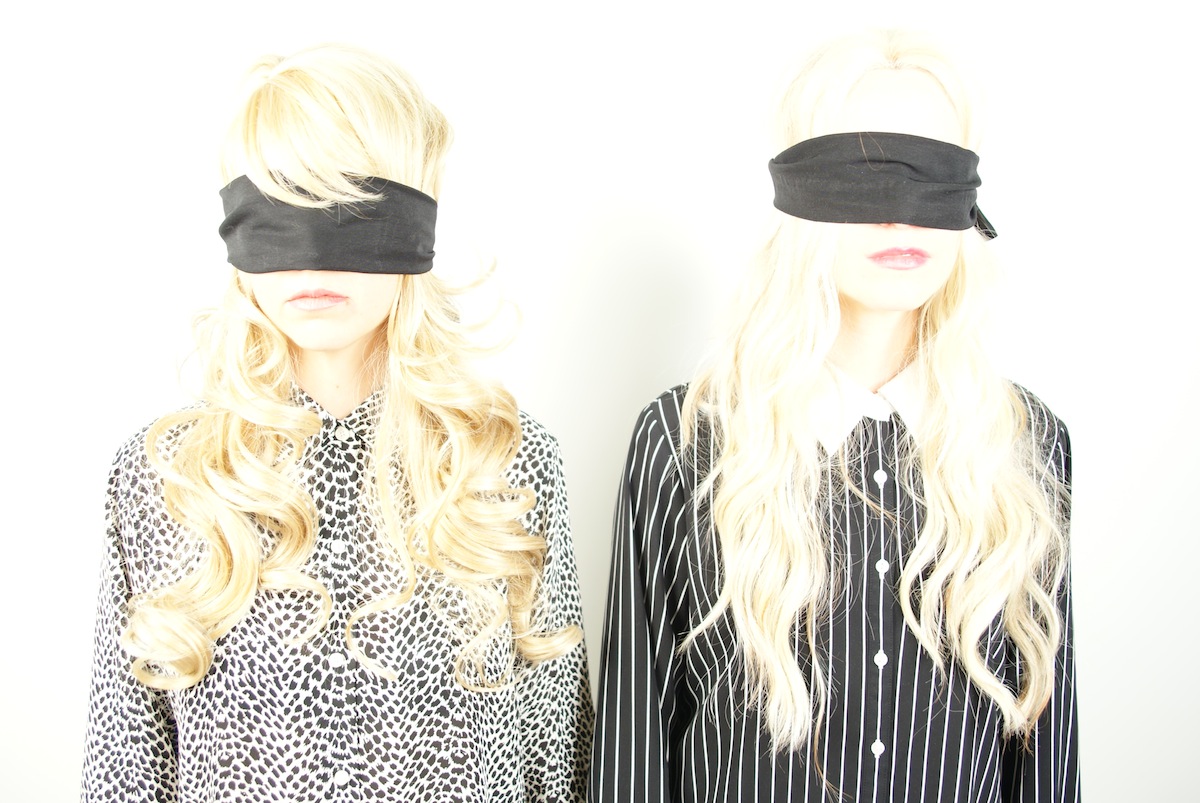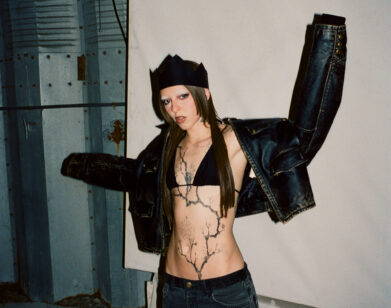The Casket Girls and the Green Fairy

ABOVE: THE CASKET GIRLS’ PHAEDRA AND ELSA GREENE
Two sisters lounged in the grass, playing Autoharp and singing bizarre lyrics, when a man spotted them from across the public square in Savannah, Georgia. He decided to approach them, and soon thereafter The Casket Girls were formed. With a dark, yet invigorating energy inherent to their music, the band released its critically acclaimed debut album Sleepwalking in 2012. Ryan Graveface produces the multidimensional indie-rock tracks, for which sisters Phaedra and Elsa Greene write whimsical and occasionally nonsensical lyrics. This week, the band will release its sophomore effort True Love Kills the Fairytale.
“I was engaged. The engagement ended, and the moment the engagement ended, I started writing this record,” Graveface says. “It’s like a breakup record, not in the sense of, ‘What have I lost,’ but more of me trying to find myself and becoming a better human being.” True Love Kills the Fairytale is far from a typical breakup album. Its 10 tracks find the girls’ ethereal voices melding with the deeper sounds created by Graveface, who also runs Savannah-based record label Graveface Records.
In accordance with his name, Graveface is fascinated by death, ESP, and in general what he calls “odd things.” Before The Casket Girls began their tour around the U.S. and Canada, we spoke with Graveface about his psychic inspirations, homemade absinthe, and the creation of the album.
EMILY MCDERMOTT: I’m interested in the girls’ writing process. I read that they were in a dream—or trance-like state of mind when they wrote the lyrics. Do you know anything about that?
RYAN GRAVEFACE: We’re very fascinated with utilizing ESP and psychic means to compose. For example, I would text each one of them individually and say, “What number am I thinking of?” And they would text me back whatever number, between 1 and 167. With Elsa, she texted me back 137, which is the exact number I was projecting. I did that with lyrics as well. Some of the lyrics on the record are lyrics I projected onto them. I didn’t and don’t know how much I believe in anything, but I also know that anything is possible. I’ve experimented with sleep deprivation writing. I’ve never done a single drug in my entire life, but I’m fucked enough that drugs don’t seem too necessary.
MCDERMOTT: How did you become interested in ESP?
GRAVEFACE: I’m very bored with life. Life is almost too simple. Even though I live a pretty cool life technically—I have a record store, I have a record label, I’m in a band—my day-to-day existence is a routine. I’ve been working full-time since I was 11 years old, [so] I got super bored with the day-to-day. I think that’s how I got really interested in very dark, odd things. I collect serial killer paintings and shit like that.
MCDERMOTT: I don’t often see trailers for albums. How did you come up with the concept of making a trailer?
GRAVEFACE: I have this very small-time production company, and one of us got a GoPro. We would go to the ocean and marshes around Savannah to see what colors we would get, as well as if we could find any gators or fish footage. The footage we were getting from that made sense not so much in a music video context, but more for very short, little bursts. We were doing that around the same time as the initial rollout for the record. We were trying to think of the first press release—do we do an MP3 or album trailer or both? Even though this record isn’t a story, per se, it wraps up the past year and a half of my life. With that, the visuals help.
MCDERMOTT: I also read that you asked fans for footage for the video of “Chemical Dizzy.” What are some of the craziest videos you got?
GRAVEFACE: Lots of nudity that I don’t know if we should use. There’s some nudity that can’t exist on YouTube without being taken down. There was some racial stuff that I think was supposed to be funny. I don’t think people were necessarily thinking properly, because there was also a lot of audio, but it’s a music video. All of the audio is going to be muted. There’s footage of people playing video games, but the focus is on the people and their conversation. It’s much stranger footage than I would have expected, but not necessarily the right strange—kind of a forced strange.
MCDERMOTT: What inspired you to reach out to your fan base for the video?
GRAVEFACE: I want people to be involved. There’s so much apathy. The formula for releasing a record is tired, although it’s new, evolving, and constantly progressing. I like to come up with ideas to make that moment in time a little more interesting.
MCDERMOTT: You create all of the music for The Casket Girls. Where do you look for inspiration?
GRAVEFACE: I’m super interested in death. My record label name is Graveface. The band is The Casket Girls. Another band I play in is The Marshmallow Ghosts. My PR company is called Noisy Ghost. I’m a one-trick pony in my interests. I’m fascinated by what attracts people to doing bad things—like noticing how normal serial killers’ or cult leaders’ lives could have been if something didn’t snap, and how oddly relatable they are to me, which is upsetting. If you look at someone like Jim Jones and see a piece of yourself, it’s horrifying. I use things like that to better myself. I know my faults and I’m desperately trying to be a better human being. That’s where a lot of the music comes from. I don’t listen to songs to be inspired.
MCDERMOTT: So how did you first become interested in music?
GRAVEFACE: I hated music. I started a label and a band because I couldn’t find anything that I connected with. I felt like people weren’t saying what I wanted to hear. I was more interested in playing basketball, and I thought I could parlay that into some kind of career until I was 15 or 16 years old and realized that people involved in such a thing are horrible, horrible people. After that, I was like, “I guess I’ll rent a guitar, because I don’t know what else to do with my time.” From there I started to write, which eventually led to me starting a label in attempt to get people to listen to what I was both interested in and writing. It’s not elitist… it’s not childish. It just never piqued my interest, which makes me feel like an alien again. [laughs] I guess that’s the theme of my life. I always feel like an outcast, even when I’m not.
MCDERMOTT: What do you do to keep yourself grounded when you feel like an outcast?
GRAVEFACE: That’s something I’ve been practicing—getting into yoga and eating really healthy. Being alone and forcing myself into any simple pattern or schedule has made me a little happier. It gives me time to think about the simple things of my day, instead of the really huge things I worry about. I usually focus on massive projects, but some of the best things in life are simple conversations you can have with another human being. That’s what I’m trying to focus on.
MCDERMOTT: What was one of the biggest struggles you faced while writing on your path of self-discovery?
GRAVEFACE: This is going to sound really bad, but I don’t mean it as bad as it sounds: I started drinking recently. I don’t do things casually, so instead of just getting into absinthe, I had to start making absinthe. That’s what I was doing simultaneously to ending this engagement and starting to write this record. I was trying to find the perfect level of absinthe that makes me feel tripped out. The struggle was learning how to rein it in and not become a stupid drunk. There are so many literary examples of what absinthe should do to you, but it hadn’t done anything to me. I was experimenting with wormwood and all kinds of shit hoping that it would make me feel anything, so I would not feel the pain I was feeling. My body doesn’t process liquor properly, so I can’t get drunk. I don’t feel the effects, and that’s the worst possible thing. You want to feel those things. Your body is feeling those things for a reason.
MCDERMOTT: Did you find a balance with the absinthe that made you feel something?
GRAVEFACE: Yeah, it blissed me out, like listening to the best, shittiest record of all time, like a Slowdive record. That’s the overwhelming feeling that relaxed me enough to be able to turn out songs. Some of those songs actually made it to the record. I thought they were too dreamy, notably “Perfect Little Soul.” All the music, that’s me at my homemade absinthe peak. [laughs] I’m desperately trying to feel what other people feel so I can relate to another normal fucking human being for once. It’s not just about alcohol at that point. It’s you. You’re realizing you’re an alien.
MCDERMOTT: What is a moment, maybe during that process, that was really formative for the album?
GRAVEFACE: There are a couple songs on that record that I don’t know if I’ll ever be able to listen to. I don’t want to play them live, because I’ll be destroyed. I was concerned the record was going to be too dark, so I focused on where I had gotten emotionally in the nine months since the breakup and tried to think positively. It turned out the songs “Day to Day” and “The Chase.” I couldn’t tell if the girls were irritated that I turned in something so late, but holy crap. The last song, “The Chase,” the lyrics they wrote… it crushes my soul. It’s exactly what I was going for. This whole record was bonding in a lot of ways, being able to get over past bullshit and move forward. I befriended the person who I was engaged to, [and] she did the cover art for the album. It feels like a family.
MCDERMOTT: What message do you want people to get from your music?
GRAVEFACE: I really like people to connect emotionally, more than a message. I’m sure Fugazi, who are personal heroes of mine, wanted you to walk away feeling empowered or [with] some locally political agenda. I don’t think of it like that. It’s letting the sound direct you and your mind. For me it’s about hope, resolve with the past and moving forward. The music is deep enough on a worldwide scale, but it’s incredibly deep on an emotional scale.
TRUE LOVE KILLS THE FAIRYTALE IS OUT TOMORROW, FEBRUARY 11. FOR A FULL LIST OF TOUR DATES, VISIT THE CASKET GIRLS’ WEBSITE.






